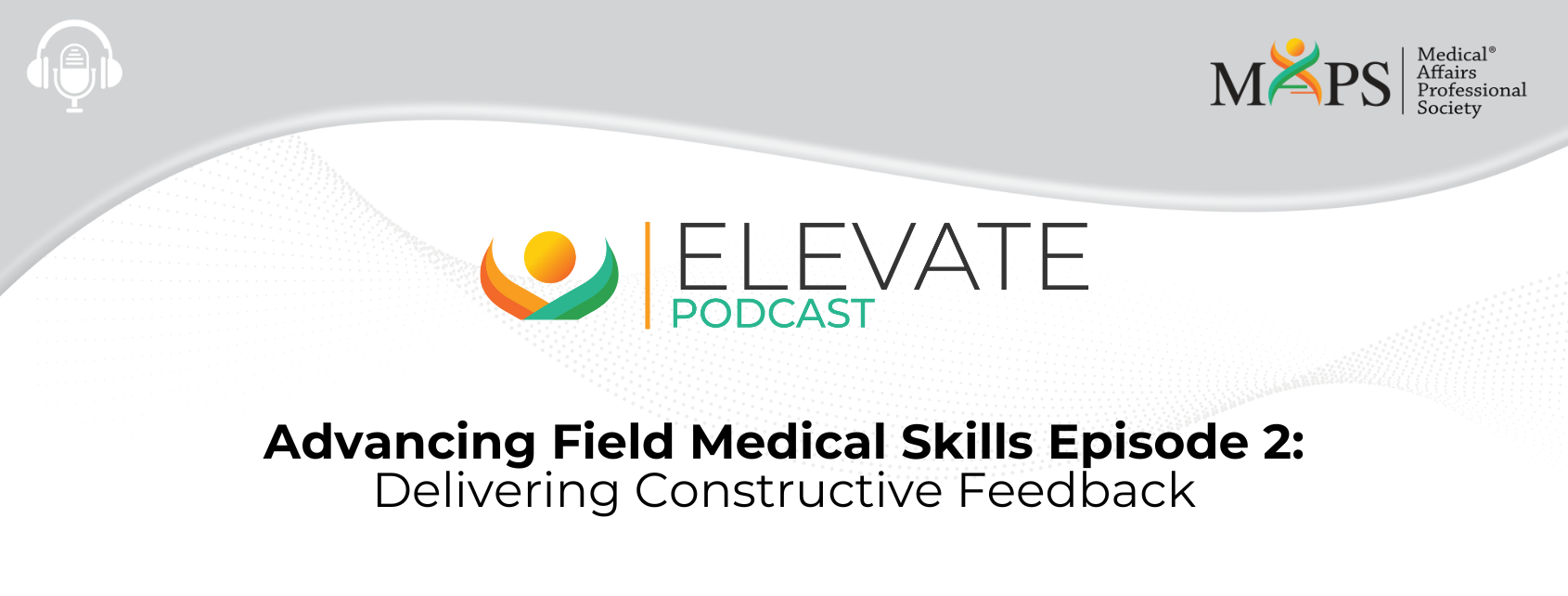Advancing Field Medical Skills
Episode 2: Delivering Constructive Feedback
Speaker: Kathryn Gann, PhD
Speaker: Karen Shopmyer
Speaker: Suzanna Lawrence
The objectives for this series of podcasts are that at the end of this series, you will be able to immediately implement one to two actions that will enhance your skills and to work more effectively within a variety of situations.
In this second podcast in the series, we will discuss delivering constructive feedback.
Following is an automated transcription provided by otter.ai. Please excuse inaccuracies.
Kathryn Gann 00:00
Welcome to the Medical Affairs Professional Society Field Medical Focus Area Working Group’s podcast series entitled, “Advancing Field Medical Skills”. In this series, we will be highlighting skills, topics and behaviors that are fundamental to field medical success. In a second podcast, we will discuss delivering constructive feedback. I’m Kathryn Gann. I’m a member of the field medical focus area working group and I’ll be the moderator for this podcast. Currently, I’m an independent consultant in Medical Affairs, having spent my 30-year career as an MSL and MSL manager, and an MSL trainer and mentor. Our legal disclaimer is as follows. The views expressed in this recording are those of the individuals and do not necessarily reflect on the opinions of MAPS or the companies with which they are affiliated. This presentation is for informational purposes only, and is not intended as legal or regulatory advice. We encourage you to engage in conversations about Field Medical with other MAPS members via MAPS Connect on the MAPS website or the mobile app. Simply log in with the email address and password associated with your MAPS account and access the global community. Then click on the discuss tab and scroll down to the field Medical Subject Area to post a question or to review previous postings. The objectives for this series of podcasts are that at the end of this series, the participant will be able to one immediately implement one to two actions that will enhance their skills and to work more effectively within a variety of situations. I’d like to thank today’s panelists for sharing their subject matter expertise with the MAPS membership. And speaking today are Karen Shopmyer, Director national accounts at Amplity Health. Karen will be our interviewer and Suzanna Lawrence, Executive Chairman of Amplity Health limited. Suzanna will be our interviewee Karen, I’m going to turn this over to you. And if you could kick us off by telling us a little bit about yourself, please.
Karen Shopmyer 02:07
Thank you, Kathryn. So my name is Karen Shopmyer, I’m a national account director with Amplity Health. I’ve spent the last 25 years in the pharmaceutical and biotech industry. And for the last 19 years I’ve been in a management or leadership role. So this topic is of great interest to me. Suzanna, would you share your background?
Suzanna Lawrence 02:32
Sure. Thank you, Karen. So I’ve been in the pharmaceutical industry for over 30 years, and have conducted a number of different roles all the way from commercial through medical and clinical, set up my own business which we’ve been running successfully for the last 14 years. And I spend most of my time either writing and facilitating learning and development programs, or providing executive coaching to my clients.
Karen Shopmyer 03:03
Thank you. So today we’re going to talk about how to deliver feedback that makes a positive impact. The goal of this podcast is to help you think more intentionally about how, when and where you provide feedback. Additionally, our goal is to provide you with a few easy tools to do this effectively. So before we get started, let’s think about the why. Suzanna, why are we having a podcast about delivering constructive feedback?
Suzanna Lawrence 03:37
That’s a really good question. Always begin with why. So I think for most of us, it’s relatively easy to give feedback to people when it’s positive, when we’ve noticed they’re doing something well, we want to congratulate them, we see that they have some skills that we appreciate. And we want them to know that that’s relatively easy, it is a lot more tricky. When you notice that somebody is doing something you want to give them constructive feedback for. So whether that’s one of your direct reports, somebody in your team or even giving constructive feedback to a senior leader or another person in a part of your business or your team. You have to sometimes take a deep breath, and be bold and be brave and think about how to construct that feedback. So the other person can do something differently as a result. And we wanted to really focus on constructive feedback to to share some tools and some tips about how to do that in a in a way that would be received. Well.
Karen Shopmyer 04:42
Thank you, Suzanna. I can think about times when I’ve received feedback has been positive and constructive. But let’s also think about times when feedback doesn’t quite hit the mark. Suzanna, would you mind sharing an example of a time you received this type of feedback
Suzanna Lawrence 05:00
Sure, Karen. So it was a long time ago. And I know there’s a kind of a joke that goes along the lines. So what was the best thing you learned from your worst manager. And this is one of those times. So I had, I was in a marketing role I was new, it was my first time in marketing, and had done a whole year’s worth of work, worked super hard, and delivered a load of stuff was actually quite excited to have my end of year appraisal. And I’d written loads of stuff about what I’d done well, and what I’d learned. And my boss opened the meeting by saying, Susana, everyone knows what you’re good at, let’s focus on the things you haven’t done well, this year. Oh, my goodness, my heart just fell. And she went on to kind of highlight some of the things that hadn’t done very well. And I left that meeting really disappointed, in fact, quite offended, that we had gone a whole year without me receiving some of this feedback. And she’d left it right till the end of the year. And I wasn’t motivated, energized, inspired, or any of those things that you want to have happen at your end of year appraisal. And I learned, never, ever do that to another person again. So that was probably my my low point, Karen.
Karen Shopmyer 06:22
Wow, that illustrates a great point, giving both timely and balanced feedback is important. What are some other things that you would suggest we think about as you look to provide feedback that makes a positive impact?
Suzanna Lawrence 06:37
Well, you’re absolutely right, the word that you use there was balanced. So it is important to be looking for the things that you want to praise and admire a person for and be very specific about that. But also, then, because none of us have the finished article, right? We’re all learning and growing, and doing things differently, maybe trying something for the first time. So it’s important that you pay attention. And that you notice. So if you’re a manager of a person that you want to give feedback for, it’s critically important that you’re observing them in real life doing their day job. So when you give them feedback, it can be specific. And you can have positive things to say naturally, but also, this, this podcast is all about constructive feedback. So it needs to be timely, you don’t want to wait till the end of the year, and have that conversation about remember that time when you and it’s months and months ago, you want to create a safe space. So think about where you’re going to give this feedback. So is there a private safe space, where it’s quiet, and that person can really hear you. So having managed people in the field, doing it in the car, is a very simple place to do it. So you’ve just been in, you’ve seen an external expert, you’ve observed them engaging in scientific exchange, you’ve been making notes, and you want to give that individual some feedback immediately in the moment, but in the car is a horrible place to do it. Because they’re driving, they’re trying to pay attention, they really can’t listen while they’re navigating through traffic. So it’s good at the beginning, if you are a manager of field based people, and you’re thinking about how and when to give feedback to that individual to elevate their skills, building in at the beginning of the day, the time and the place, you’re going to do that. I think that’s really important. So you contract with that individual, when you’re going to have that two way conversation. So it’s not just you giving them feedback, but also, what feedback do they have for you and having that in a, in a quiet, safe, private environment? I think it’s really important to build into your schedule.
Karen Shopmyer 08:58
Great. You know, one of the terms that I’ve heard you use in the past is feed forward. Would you mind sharing that concept with those who are listening?
Suzanna Lawrence 09:09
so feedback is the word that we use, right? But there is the word back in that in that phrase, which kind of implies looking backwards. And what you really want to do is look back to go forwards. So how are you investing in the skills and capability of this individual, to do something differently, to stop doing something to do something even better, so I prefer the expression feed forward so that you’re both looking forward together. And it does mean that you might have to be bold, brave, courageous, and careful about how you alert them to what it is that you’ve noticed that you might need to do differently. One One thing I must say is the feedback or feed forward Should never be about you. This is not about you trying to look clever or trying to sound smart, because you’ve noticed something. It’s only ever about developing the other person and helping them to be even better at their day job.
Karen Shopmyer 10:16
I love that Suzanna. Gosh, even when you need to deliver tough feedback, when the person receiving it understands that it’s coming from a place to build them up, they are more open to receiving feedback and making changes. Mm hmm. Yeah,
Suzanna Lawrence 10:34
I would think you should even think about the tone of the voice that you use when you’re giving feedback. Because if it is constructive feedback, and you’re using a critical tone of voice, it’s very, very hard for the other person to hear that and to listen carefully. So it’s, it’s using your nicest quality voice. When you’re you think about somebody who you love. And you want to give them some constructive feedback was the tone of voice you use with someone that you really care about. And you really want to help. That’s the tone of voice you want to use when you’re giving constructive feedback to another individual. So that they appreciate the intention is always positive. And it’s not about you, it’s always about them.
Karen Shopmyer 11:24
So much to think about. My takeaway from our conversation so far is that it’s really important to think about structuring your interactions to allow for constructive delivery of feedback. What kind of tools could our listeners use, to structure their feedback appropriately?
Suzanna Lawrence 11:42
Hmm. One of the tools that I’ve used for years that I really like, is called Boost, that’s the O S T. Now, our listeners, I don’t know where you are, while you’re listening to this podcast, you might be out for a run or walking your dog or doing the washing up or whatever you’re doing, whilst you listen in. But if you can note this down, if you’re not aware of this tool, I found it really helpful. So boost, we put babies on booster seats in cars, so that they can see where you’re going. We there are booster rockets on the outside of rocket to help a rocket go, you know, leave the Earth’s atmosphere. So when we think about boost, it really is about elevating people. So the B is for balanced. So it has to be balanced. You have to be noticing things that they do well and things that perhaps they’re not doing well enough yet. That Oh, the first row is observed. You saw it. You observed it the feedback that you’re giving is real and evidential and hard to argue with what you don’t want is the person to go. Yeah, but no, but yeah, but you don’t understand, I wouldn’t do that, ordinarily, and it’s just so it’s really observed and it’s owned. That’s the second Oh, so there’s nothing worse than giving people feedback or feed forward that you’ve heard from somebody else. Because you’re, it’s hearsay. Now, it’s really important that you own that feedback, and that you’ve seen it. And the S stands for specific. So it’s real. It’s based on facts and data, and you give real life examples. So it’s hard to argue with. And then the T stands for timely. So it’s not something that you noticed last February, is actually something that’s happened very, very recently. So hopefully, that’s a useful tool, boost B O S, T, balanced, observed, owned, specific and timely.
Karen Shopmyer 13:48
That is definitely a helpful tool. If you have any more tips that can help our listeners as they’re planning to deliver feedback, perhaps to someone who may not be open to it.
Suzanna Lawrence 13:59
Well, that’s a good point, actually. Because if you’ve contracted with that person, that as part of your ride along or your field visit, or you want to give feedback, let’s say to a senior leader, and you haven’t contracted with them that they’re going to have feedback from you. The way to do it well, is to think about their style. So I’m thinking about social styles now. So if the person you want to give feedback or feed forward to and it is constructive feedback, and you might be a little nervous about doing it, but you know, it’s the right thing to do. One way to get them to hear you better is to flex your style a little bit because I don’t know if you’ve heard the expression. People like people who are like them, comes from Robert Cialdini, who’s written a lot of books about influencing others, also engaging with people so you get a better outcome. So people like people who are like them. So this is about mirroring and matching their energy. So let’s imagine you’re going to give some feed forward to a person that you think might not necessarily want to hear it. How can you flex your style to be even more like them in the moment. So imagine this person is enthusiastic, energetic, and loud, and creative and a Boolean, and you are not any of those things, you might have to pick up your energy, so that they can hear you. Conversely, if this person is thoughtful, and quiet and careful and reflective, you might want to perhaps tone down your energy and speak their pace and their volume, and leave some pauses in so they can think about how they feel about what you’ve just said, what they think about it, and how they plan to respond. So it’s just about paying attention, and deciding in advance how you’re going to give that feedback to enable the other person to truly hear you. And know that your intention is positive, and you’re only doing this for them and their benefit. And I think that when they appreciate that they’re much more likely to say thank you for the conversation that you’ve just proactively had with them.
Karen Shopmyer 16:36
Thank you so much, Suzanna, I really appreciate the insights that you have shared today. This has been helpful for me, I know. And hopefully it’s been helpful for our listeners as well.
Suzanna Lawrence 16:48
Well, thank you, Karen. And in that vein, I really hope that we do have people listening in and want to give us feedback about what we’ve just created here in this podcast, we would love to hear what people found a benefit. And if there’s anything else you think that we could cover in a future podcast, we would love to have your feed forward. Thank you,
Kathryn Gann 17:12
Karen, and Suzanna, thank you so much for participating today. You know, we started off by talking about the objectives, which were that we were trying to give people, our listeners something that they could implement immediately, one to two actions that would enhance their skills. And certainly there’s feed forward, which is a great way to put it. I loved boost. I think that just brings it, it ties it up into a nice little package. You know, it’s very easy to remember an acronym. And it’s kind of like remembering smart, but yeah, that acronym. It means something when you remember it and you can build it into what you’re doing. So and also social styles, flexing your style, what do we always tell MSLs flex your style when you’re with a thought leader. So it’s should be no different and giving constructive feedback, whether as a manager to your direct report, or as we’ve talked about, maybe it’s somebody above you, and you need to talk to them and give them some feedback, some constructive feedback. So you’ve given us many skills to use, and I certainly appreciate that. So this has been the second podcast in this series on advancing field medical skills. If you’re a MAPS member, thank you for your support of MAPS. If you’re not yet a MAPS member and would like access to additional resources in this area, please visit the MAPS website to explore joining and that is MedicalAffairs.org/membership. This concludes the podcast.






